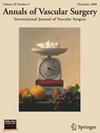晚期肾细胞癌延伸至下腔静脉需要血管外科医生介入治疗的手术策略的长期结果。
IF 1.6
4区 医学
Q3 PERIPHERAL VASCULAR DISEASE
引用次数: 0
摘要
目的:评价晚期肾细胞癌(RCC)伴血栓延伸至下腔静脉(IVC)的远期手术效果。方法:2008 ~ 2023年,29例患者行根治性肾切除术合并下腔静脉重建术。手术方式根据静脉血栓的头侧延伸进行分层:从肾静脉进入肝下段(I级,n=2),进入肝静脉下方(II级,n=20),进入肝上段(>III级,n=7;包括一个四级)。结果:直接缝合18例(62.1%),补片修复8例(27.6%),移植物置换3例(10.3%)。I级、II级和>III级的手术结果与开腹率(分别为0%、5.0%和43.9%)和体外循环使用率(分别为0%、5.0%和85.7%)相关。虽然术中有1例III级患者(3.4%)死于急性肺栓塞,但根据肿瘤血栓延伸程度不同,术后并发症发生率无显著差异。5年总生存率为53.8%,病因特异性生存率为65.7%。结论:虽然肿瘤血栓扩展会影响手术侵袭性,但我们的策略不会影响围手术期的预后,并可能提高晚期RCC的预后。本文章由计算机程序翻译,如有差异,请以英文原文为准。
Long-term Outcomes of Surgical Strategy for Advanced Renal Cell Carcinoma Extending into the Inferior Vena Cava Requiring Intervention by a Vascular Surgeon
Background
To evaluate the long-term surgical outcomes of advanced renal cell carcinoma with a thrombus extending into the inferior vena cava (IVC).
Methods
From 2008 to 2023, 29 patients underwent radical nephrectomy with IVC reconstruction. Surgical procedures were stratified by the cephalad extension of the IVC thrombus: from the renal vein into the infrahepatic segment (level I, n = 2), below the hepatic vein (level II, n = 20), and into the suprahepatic segment (level > III, n = 7; including 1 level IV).
Results
IVC reconstruction was performed by direct suturing in 18 patients (62.1%), patch repair in 8 (27.6%), and graft replacement in 3 (10.3%). Operative outcomes for levels I, II, and >III were associated with the rate of thoraco-laparotomy (0%, 5.0%, and 43.9%, respectively) and use of cardiopulmonary bypass (0%, 5.0%, and 85.7%, respectively). Although 1 level III patient (3.4%) died due to acute pulmonary embolism during surgery, there was no significant difference in the incidence of postoperative complications according to the level of tumor thrombus extension. The 5-year overall survival and cause-specific survival were 53.8% and 65.7%, respectively.
Conclusion
Although tumor thrombus extension can influence surgical invasiveness, our strategy did not impact perioperative outcomes and may enhance advanced renal cell carcinoma prognosis.
求助全文
通过发布文献求助,成功后即可免费获取论文全文。
去求助
来源期刊
CiteScore
3.00
自引率
13.30%
发文量
603
审稿时长
50 days
期刊介绍:
Annals of Vascular Surgery, published eight times a year, invites original manuscripts reporting clinical and experimental work in vascular surgery for peer review. Articles may be submitted for the following sections of the journal:
Clinical Research (reports of clinical series, new drug or medical device trials)
Basic Science Research (new investigations, experimental work)
Case Reports (reports on a limited series of patients)
General Reviews (scholarly review of the existing literature on a relevant topic)
Developments in Endovascular and Endoscopic Surgery
Selected Techniques (technical maneuvers)
Historical Notes (interesting vignettes from the early days of vascular surgery)
Editorials/Correspondence

 求助内容:
求助内容: 应助结果提醒方式:
应助结果提醒方式:


